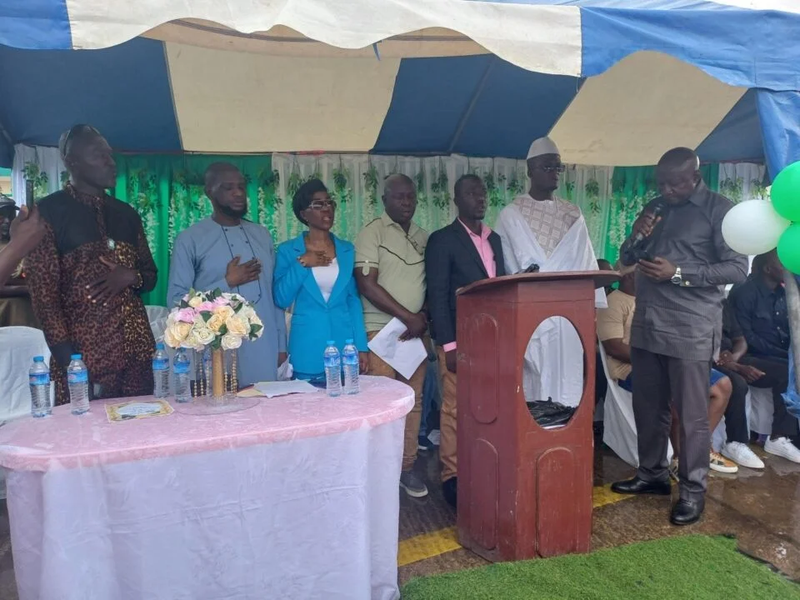‘Foreign Shipping Companies Must Stay Out of Domestic Trucking Services’ – Newly Inducted Truckers Union President Declares

National Truckers Union (LNTU) newly inducted President, Omaru A. Fofana, has drawn a hard line on the growing involvement of foreign shipping companies in Liberia’s domestic trucking institution.
National Truckers Union (LNTU) newly inducted President, Omaru A. Fofana, has drawn a hard line on the growing involvement of foreign shipping companies in Liberia’s domestic trucking institution. Fofana was sworn into office with several new officials including Abraham B. Mulbah, Sr.- vice President, Yahaya S. Kemokai- Secretary General, Fatu S. Larkin-Treasurer, Hassan Konneh- Operations Manager, James Z. Kessely- Deputy Operations Manager. Delivering his inaugural address, Fofana called for “constructive engagement” to defend the liberalization policy that grants Liberian truckers exclusive rights to the country’s transport contracts. “Our true opponent is not each other,” said Fofana, “but disunity and the disregard for the rule of law. This election is not a personal victory – it is a victory for the Liberia National Truckers Union.”
In his speech that emphasized reconciliation, professional reform, and national development, the LNTU President announced initiatives aimed at restoring credibility to the industry, improving tax compliance, and removing the stigma of disorder and illegality that has plagued some operators. “Too many of our trucks are on the road without proper documents – no maintenance, expired licenses, incomplete insurance, no road worthiness certificates. Some of our own still view road safety as optional. This cannot continue,” Fofana stressed. He committed his administration to full regulatory compliance and professionalization across the sector. The leadership, he said, intends to “impress government and citizens with results – not noise.”
In his remark on the contentious issue of foreign interference, Fofana emphasized that “this must stop.” Said Fofana, “We strongly call on foreign shipping companies to stay out of local transportation services. These contracts belong to Liberian truckers. When foreign companies take these contracts and subcontract them to us at unfair rates, it strangles our growth. This must stop – not through protest – but through firm, constructive engagement.” He pledged to defend the existing pricing structure, warning against destabilizing tactics that would harm truckers’ livelihoods. “This structure wasn’t made overnight – it is an economic lifeline built through dialogue, sacrifice, and a deep understanding of the realities truckers face on the ground.”
He, however, urged the APM Terminal and the Management of the National Port Authority (NPA) to open the Amogo Gate, which he said will ease congestion in Bushrod Island, one of Monrovia’s busiest trucking hubs. “This gate sits right beside the compact site. Opening it will decongest traffic and streamline port logistics,” he pleaded. He also appealed to the Liberia National Police (LNP) for a shift from punitive measures to educational programs for truckers, stating that “random ticketing is not the solution” to the challenges facing the transport sector.
Fofana also launched the “Link to Parking Lab” project – a proposed trucking park initiative designed to reduce congestion, generate revenue, and create a more organized parking environment for truckers. “We cannot fix the logistics industry if we treat customer service like a favor. Liberia is watching us. Let’s lead with discipline, unity, and vision,” he urged his fellow unionists. Delivering his keynote message, Deputy Managing Director NPA, James Bernard, described the Liberia’s truckers as the unsung heroes of trade and commerce, urging the newly inducted leadership of the Liberia National Truckers Union (LNTU) to lead with transparency, accountability, and vision. Bernard emphasized the vital role truckers play in sustaining the nation’s economy, calling them the invisible engine behind every imported and exported good that passes through Liberia’s ports.
He described the LNTU not merely as a professional body, but as a powerful symbol of resilience, unity, and advocacy. “Without the commitment of the men and women who navigate our roads day and night, our economy would grind to a halt,” Bernard said. “This union is a beacon for fair labor practices, road safety, and the protection of truckers’ rights across Liberia,” Bernard noted. “Today’s induction is more than ceremonial—it is a call to action.” Bernard stressed key issues affecting the trucking industry, including deteriorating road conditions, delays at ports and checkpoints, unfair tariff practices, and safety risks for drivers. He called on the union to be proactive and solution-oriented in addressing these challenges. “Your leadership must be defined by engagement—not just with your members, but with every stakeholder in the value chain—from customs authorities to private sector partners,” he urged. He also emphasized that leadership should not be about titles, but about service and advocacy. Bernard reminded them of their role in Liberia’s economic infrastructure. “You are not just drivers—you are facilitators of trade, guardians of commerce, and vital contributors to national growth,” he declared. He called for continued professionalism and unity among truckers and stressed the need for a strong partnership between the union, the government, and private actors to modernize Liberia’s logistics and transportation systems.


